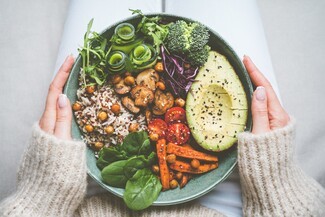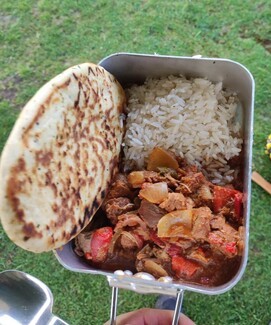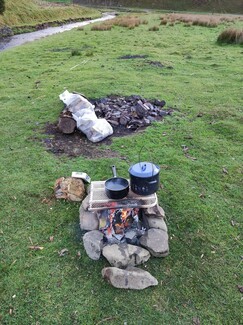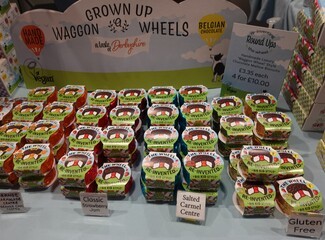Why This Veggie Gypsy Supports Traditional Hunting Practices By Gemma Lees

This is an opinion piece outlining my views, as a vegetarian for the last 26 years, on the Global meat industry, my support of traditional GRT subsistence hunting practices and my recent visit to the ‘Just V’ show where I caught up with the CEO of The Vegetarian Society and tried lots of tasty new veggie foods.
I’m a Gypsy and a veggie, which seems quite rare within our community. The most common question I get asked is ‘why?’ and my answer comes in two parts. Firstly, the global meat industry is ecologically unsustainable, ridiculously cruel and strips much-needed resources from the world’s poorest people and secondly, I love animals. I couldn’t bring myself to kill one and I don’t feel like I have the right to pay some faceless corporation to do this for me. I believe that anyone who consumes animal products should have a deeper connection to the animal that they’re taken from and this is a connection that can come from catching and butchering your own meat.
Yes, a vegetarian who supports hunting. I know that this might seem like a bit of a contradiction but let me explain. Traditional Gypsy, Roma and Traveller means of hunting and consuming meat are connected, sustainable and don’t take from developing nations and I truly respect that. Simply put, if you can catch it and kill it, I think that you’ve earned the right to eat it.
I spoke to three members of a Gypsy and Traveller Facebook group, Kelvin, Carl and Dale about their experiences with traditional hunting practices and they agree with some of my views. Kelvin explained that rabbit was caught by his family when times were hard. One rabbit would be stewed down over several days, with vegetables added along the way and would feed the entire family with the only waste being the bones. Carl agreed that his family only ever hunts what they are intending to eat and only when in season. They never fish or shoot out of season to allow the animals to replenish and prepare their catches without wasting anything. Pictured is his favourite game meal, a curry prepared on an open fire with pheasant, partridge and rabbit. Dale is teaching his two boys, 11-year-old Reagan and 4-year-old Ronahan, that they only ever catch what they need and never kill for the sake of it. He too doesn’t hunt during breeding season and uses all of his catches, with any waste going to feed his ferrets. Pictured is his family’s favourite meal, game stew.

I fully support subsistence hunting, done only to feed your family and without waste, but why don’t I support the global meat industry? It’s all meat eating, right? Well, not exactly. My issues with this industry are threefold: cruelty, unsustainability, and the use and abuse of developing nations.
Let’s unpack these reasons:
Firstly, cruelty. Isn’t any death of an animal for food cruelty in a vegetarian’s mind? Well, no. The suffering dealt out by animal agriculture begins way before the death of any animal. The Humane League UK [1] explains that 94% of all animals raised for food are battery farmed. Unlike the rabbits, duck and pheasants shot by GRT hunters, these 130 billion animals will never be free. They will never experience the outside world and many won’t even have enough space to ever fully extend their limbs. Chickens, for example, have been selectively bred to have such ridiculously large breasts that soon enough they can’t stand, they instead are forced to lay in their own waste, which burns their skin.
Fish, like the trout caught by Dale’s son, don’t even have the meagre legal protections afforded to land animals in the UK. Scientists have proven that fish do feel pain the same as other animals. Despite this, an undercover operation undertaken by Animal Equality UK [2], caught farmed fish having their gills cut while still conscious and then being brutally and repeatedly clubbed to death by a jolly unnamed man who then did a little victory dance.
Secondly, the environmental impact. So, we’ve all heard of Global Warming by now, but how much of it is caused by the meat industry? A 2021 report, published in Nature Food [3], states that 20% of all human-caused greenhouse gas emissions are from livestock. 60% of all food system emissions are also caused by meat farming, this is twice that of plant-based foods. A UN-FAO [4], (United Nations Food and Agricultural Organisation), report found that 37% of human-caused methane is also from livestock and as a greenhouse gas, methane is over 20 times stronger than CO2. To put this into perspective, The Vegetarian Society UK [5], in a booklet introducing vegetarianism, states that animal agriculture is responsible for more greenhouse gasses than all of the world's transportation systems combined. They call going veggie or vegan, the single biggest thing anyone can do to reduce their impact on the planet.

This impact is lessened by traditional hunting and farming practices due to what the animals eat and their waste. Compassion in World Farming [6] explains that traditional methods of farming are relatively efficient, as the few animals eat natural waste products, such as grass. Wild animals do the same. The ‘fast-growth, high-yield’ methods used by industrial farms, however, leads to substantial amounts of mainly soya-based feed being grown. These use massive amounts of fertiliser and pesticides. The waste from wild animals acts as manure, replenishing the soil with essential nutrients, but the sheer amount of waste cased by factory farming is often mismanaged, leaking into watercourses and killing local wildlife.
That leads us to my third and final massive issue with the global meat industry, its treatment of developing nations. Brazil, a developing country and home to 60% of the world’s rainforests, is one of the world’s largest exporters of soybeans and meat from cows, pigs and chickens. Unearthed, Greenpeace’s [7] investigative journalism arm, uncovered in November 2020 that feed used by UK farm animals was supplied by a company linked to deforestation in the Amazon and another vital Brazilian ecosystem, the Cerrado. Animal Equality UK [8] explains that illegal land-clearing in the Cerrado for the production of soya for animal feed, has led to the loss of 50% of its vegetation. That’s an area the size of England, Spain, Portugal and Italy combined. Factory farming itself is responsible for more than 80% of Brazil’s deforestation, leading to more forest fires and, as Global Witness explains, devastating impacts on local people’s food, water, culture and livelihoods.
If you’ve read all of that and are still thinking, I just want the convenience of buying meat from the local supermarket. I’ll let you into a secret, my family does this too. My husband is a meat eater and despite having killed, skinned and stewed rabbits in the past, he certainly doesn’t kill everything he eats. So, what does he do instead? Well, he cuts down on his meat consumption as much as he can. There are a variety of ways that you can do this.
Meat Free Monday [9] is a national campaign to encourage people to cut out meat for just one day a week. Their website’s calculator states that one person doing so for just one year will save: 789 bathtubs of water, 54 fish, 3 tennis courts of forests, 434 miles of greenhouse gasses and 4 chickens. They will also add 2 days to their life expectancy and prevent 2 people in developing counties going hungry.
Another way is to try one of the thousands of alternatives available on the market now. When I visited the Just V Show in Birmingham in November, I caught up with Richard McIlwain, the Chief Executive of The Vegetarian Society and we discussed the various food and drink items that carry either their vegetarian or vegan approval trademark. The mark means that the item contains only vegetarian or vegan ingredients and also that nothing non-veggie or vegan was used during the production process. I was particularly excited to chat about the new McPlant, which Richard developed with McDonald’s. It’s an incredibly tasty cheeseburger that also happens to be completely vegan and my son and I love it! KFC also offer a vegan “chicken” burger and a look around your local supermarket will reveal a treasure-trove of products to replace meat with. Sandwich slices, frozen nuggets and fingers, chilled burgers, sausages and mince, tinned pate and all manner of tasty treats and desserts!

My and my son’s favourite picks from The Just V Show were:
Wikinger: Europe’s biggest meat manufacturers in a possible ‘if you can’t beat them, join them’ move have opened a vegan and veggie factory with all vegan and veggie workers. We tried and loved their nuggets, hot dogs and “smoked salmon”.
Kirsty’s: They make 12 different vegan & gluten-free frozen ready meals, and desserts. We tried and loved the mac and cheez, billionaire slice and apple pie.
Anandas: They make plant-based marshmallows, (as regular ones are made with the animal derivative, gelatine). We tried and loved their ‘Grown-Up Wagon Wheels.’
Freedom Mallows: They also make plant-based marshmallows and gummies too, which are fat free and palm oil free. We tried and loved the pink, uncoated mallows.
Shore: They are a Scottish company who make sustainable, vegan snacks, ramen and pestos. We tried and loved the Peking flavoured chips.
Caraboo: They make “not choc” bard which are gluten free, vegan, palm oil free and come in a non-plastic wrapper. We tried and loved the coconut bar.
Uniqucorn: They make vegan flavoured popcorns and treat boxes. We tried and loved the candyfloss flavour.
Green & Grainy: They make plant-based truffles and cakes. We tried and loved the Snickeroo as it tastes just like a Snickers!

There are even more benefits to eating a more plant-based diet, as explained by Pro Veg International [10], it can positively affect your health too. People following plant-based diets usually eat closer to the recommended daily intakes of protein, carbohydrate and fats than those who eat meat, and their intake of fibre and many vitamins is usually higher too. The Humane League UK [11] add that people who follow plant-based diets usually also have better digestion, more energy, improved heart health and are less likely to be a Type 2 diabetic than meat eaters.
I’m not asking everyone to suddenly become a veggie or vegan or run out and start catching fish and shooting pheasants rather than going to the supermarket. But if we all start to respect the animals that provide the meat we’re eating, in line with the beliefs and practices of traditional GRT subsistence hunters, if we look a bit closely at what we’re eating, what the supply chain was, how it lived and what we could substitute it with, we could all live healthier, more sustainable and maybe even tastier lives!
By Gemma Lees